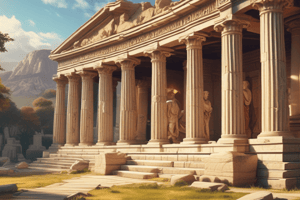Podcast
Questions and Answers
What year marks the end of the monarchial era and the beginning of the republic in Rome?
What year marks the end of the monarchial era and the beginning of the republic in Rome?
- 100CE
- 27BCE
- 509BCE (correct)
- 44BCE
What was the official religion of the Sassanid Empire?
What was the official religion of the Sassanid Empire?
- Buddhism
- Paganism
- Zoroastrianism (correct)
- Christianity
What significant political change did Diocletian implement in the Roman Empire?
What significant political change did Diocletian implement in the Roman Empire?
- He ended the use of Roman legions.
- He established the Senate.
- He divided the Roman Empire into two parts. (correct)
- He abolished the monarchy.
For what crime was Socrates tried and executed in 399 B.C.E.?
For what crime was Socrates tried and executed in 399 B.C.E.?
Which military leader was given the title of Augustus in 27 B.C.E.?
Which military leader was given the title of Augustus in 27 B.C.E.?
What code of law was lost at the end of the Roman Empire but later rediscovered?
What code of law was lost at the end of the Roman Empire but later rediscovered?
What characterized the relationships of Spartan men in the Archaic period?
What characterized the relationships of Spartan men in the Archaic period?
Who established the Academy dedicated to philosophy?
Who established the Academy dedicated to philosophy?
What was one of the primary outcomes of the First Punic War?
What was one of the primary outcomes of the First Punic War?
Who was notable for corrupting the youth of Athens?
Who was notable for corrupting the youth of Athens?
What was the role of Clovis in the Merovingian dynasty?
What was the role of Clovis in the Merovingian dynasty?
What aspect distinguished Spartan male relationships during the Archaic period?
What aspect distinguished Spartan male relationships during the Archaic period?
Which military leader posed a significant threat to Rome during the Second Punic War?
Which military leader posed a significant threat to Rome during the Second Punic War?
What significant contribution did Justinian's Code make to legal systems?
What significant contribution did Justinian's Code make to legal systems?
What notable title was adopted by Roman leaders during the territorial division initiated by Diocletian?
What notable title was adopted by Roman leaders during the territorial division initiated by Diocletian?
Which of the following statements about the Greek Polis is accurate?
Which of the following statements about the Greek Polis is accurate?
Who was responsible for establishing a well-known philosophical school in ancient Greece?
Who was responsible for establishing a well-known philosophical school in ancient Greece?
Which of the following accurately reflects the religious practices of the Sassanid Empire?
Which of the following accurately reflects the religious practices of the Sassanid Empire?
Flashcards are hidden until you start studying
Study Notes
Roman Republic
- 509 BCE marks the end of the monarchial era and the beginning of the Roman Republic.
Sassanid Empire
- The official religion of the Sassanid Empire was Zoroastrianism.
Ancient Greek
- Linear B is the earliest form of written Greek.
Greek City-States
- The Greek Polis was not the first form of city-state to emerge.
Roman Empire
- Diocletian divided the Roman Empire into two parts.
- Octavian was given the title Augustus in 27 BCE.
- Justinian's Code was lost at the end of the Roman Empire but was later rediscovered and formed the basis of European Law.
Spartan Men
- Spartan men in the Archaic period had their most meaningful relationships with other men.
Second Punic War
- Hannibal, the Carthaginian general, brought the Second Punic War to the gates of Rome.
Socrates
- Socrates was tried and executed for corrupting the youth of Athens.
Plato
- Plato established the Academy, a school dedicated to philosophy.
First Punic War
- The First Punic War ended with a Roman victory and the creation of Rome's first navy.
Merovingian Dynasty
- Clovis, a fifth-century Merovingian leader, helped unify the Franks.
Roman Republic and Empire
- 509 BCE marks the end of the monarchical era and the beginning of the Roman Republic.
- Octavian was given the title Augustus in 27 BCE.
- Diocletian divided the Roman Empire into two parts.
- Justinian's Code was lost at the end of the Roman Empire but rediscovered and became the basis of European Law.
Ancient Greece
- Linear B is the earliest form of written Greek.
- The Greek Polis was not the first form of city-state to emerge.
- The official religion of the Sassanid Empire was Zoroastrianism.
Athenian Society
- Socrates was tried and executed in 399 BCE for corrupting the youth of Athens.
- Plato established the Academy, a school dedicated to philosophy.
Spartan Society
- Spartan men's most meaningful relationships were same-sex ones.
Carthaginian Empire
- Hannibal, a Carthaginian general, brought the Second Punic War to the gates of Rome.
Roman Military
- The First Punic War ended with a Roman victory and the creation of Rome's first navy.
Frankish Empire
- Clovis, a fifth-century Merovingian leader, helped unify the Franks.
Studying That Suits You
Use AI to generate personalized quizzes and flashcards to suit your learning preferences.



